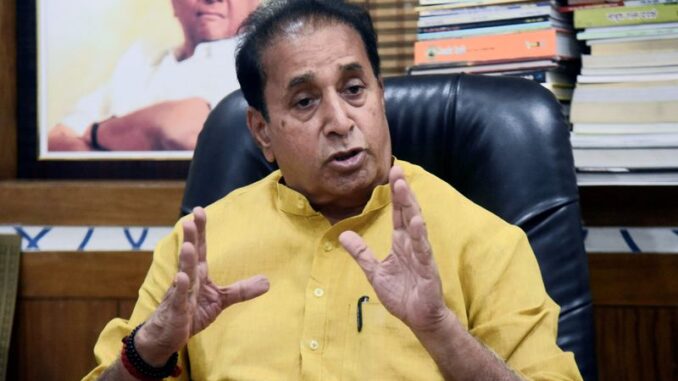
Ex-minister Deshmukh must explain why he did not object to the reinstatement of a tainted cop

I was surprised to receive a book written by Maharashtra’s former Home Minister Anil Deshmukh. I had heard tales of how transfers of police personnel at all levels were effected through political pressure during his tenure. He faced stiff competition from an IPS officer (now retired), Param Bir Singh. The good name of the Mumbai city police came under threat while they were in office.
The Maha Vikas Aghadi (MVA) — comprising the Uddhav Thackeray-led Shiv Sena, the Nationalist Congress Party (NCP-Sharad Pawar) and the Congress — ruled Maharashtra from November 2019 to June 2022. The ruling alliance chose a wrong man as the Commissioner of Police (CP), Mumbai. Simultaneously, Pawar picked Deshmukh as the minister supervising the working of the police force. It was a deadly combination that was bound to cause an explosion sooner than later. And it did.
On February 25, 2021, a Scorpio car, laden with 20 gelatin sticks — but mercifully without a detonator — was found parked near Mukesh Ambani’s residence (Antilia) on Altamount Road, an upmarket residential area of the city. The car was traced to Mansukh Hiren, a friend of then CP Param Bir’s ‘blue-eyed boy’ Sachin Vaze, who was an assistant police inspector (API) in the Crime Branch. It was established by the Anti-Terrorism Squad (ATS) of the state police and the National Investigation Agency (NIA) that Vaze had been seen in that Scorpio on earlier occasions.
Another car, an Innova, belonging to the Crime Branch, was specially allotted to Vaze. That was also seen in the vicinity of the Ambani house at the same time. It was apparent that the Crime Branch’s intelligence unit, headed by Vaze, was involved in the planting of the Scorpio outside Ambani’s home for reasons that remain undisclosed to this date.
Vaze had been suspended as he was facing a murder charge. His visiting cards projected him as an ‘encounter specialist’; his associates in the private security business used to distribute these cards among potential customers. Vaze had served under inspector Pradeep Sharma, the doyen of ‘encounter specialists’, in the early years of his service in the police. Sharma and Vaze were in touch with each other and also with the IPS officer who has been targeted by Deshmukh in his book, Diary of a Home Minister.
The officer had been the CP of the neighboring city of Thane. His image in the eyes of Thane’s residents left much to be desired. His image in the eyes of his own men, whom he was chosen to lead, was even worse.
This officer had tried desperately for the Mumbai police chief’s post when his tenure as the Thane CP ended. Two excellent officers, DD Padsalgikar and SK Jaiswal, were sent back from Central deputation. The BJP-led Central Government had correctly assessed the risk of installing a wrong man as the chief of the Mumbai Police.
When the MVA government was sworn in and the Home portfolio was allotted to the NCP, Mumbai residents were saddled with a choice that puzzled them. How did the appointee avoid the eagle eye of Pawar? The officer himself let it be known that Pawar had interviewed him and advised him to not let down a much-respected force and sully its good name.
Deshmukh’s account of his post-Antilia relations with the CP is a defense of himself in the case registered against him by the CBI and then the NIA on the allegations made by his friend-turned-foe after the latter was removed from the top post. The minister was accused by the CP of summoning Vaze and demanding Rs 100 crore a month as his share of the illegal collections that Vaze was reportedly making from bar owners and others.
The former Home Minister does not explain in his book why and how the CP was chosen. He must answer that question because the decline in the police’s performance began from there. Further, he does not explain why he, as Home Minister, did not object to the reinstatement of Vaze in service despite the latter facing a murder charge. He also does not explain how a hands-on minister like him did not advise the CP to follow protocol procedures and ensure that Vaze reported to senior officers in the Crime Branch and not to the CP directly. The intelligence unit is supposed to be headed by a senior inspector. How was an API made the head of that important unit? Why did the CP summon the ACP in charge of the social services (SS) unit and tell him to involve Vaze in his work? The SS unit of the Crime Branch deals with the city’s brothels!
The discovery of explosives in a car near Ambani’s house was itself an indicator that things were going wrong for the city police. No API, even a swashbuckler like Vaze, could have dared to carry out such a project without the CP’s knowledge. If the latter insists that he knew nothing of the plan, that admission alone would disqualify him from holding high office.
The subsequent murder of Hiren conclusively showed that the menace of encounter specialists should be buried once and for all. That burial had been effected by Anami Roy, who was the CP two decades ago. City residents were breathing easier till Vaze was inducted into the Crime Branch and given powers that were well beyond his rank. Did the minister not know about the rumblings in the police because Vaze operated as the CP’s alter ego?
The almost unanimous opinion in Mumbai’s police force was that the Home Minister and the CP were in league. After the Scorpio fiasco, the latter got off the hook by teaming up with the BJP, then in the Opposition.
The image of Mumbai’s city police suffered considerably from the games that politicians played. And this is what should alarm the city’s residents. Deshmukh’s defense of the part he played in the episode, as reflected in his book, is as he intended it to be — his defense. The facts against the ex-CP that he has disclosed need to be tested also, but in a court of law.
(Julio Ribeiro is a Former Ambassador & DGP, Punjab)




Be the first to comment